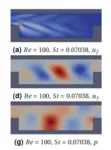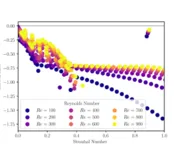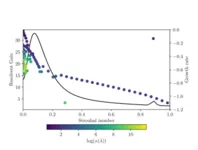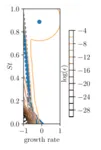Computational Flow Stability and Transition
| Credits | 6 SWS, 6 ECTS |
| Sessions | Wednesday 12:45 - 15:15 and Thursday 10:00 - 11:30 (8 sessions) |
| Rooms | MW 1701 (lecture and hands-on) |
| Contact | Grégoire Varillon, Philipp Brokof |
This module is composed of three courses that students should follow simultaneously. In the first half of the semester, the teaching is organized around a morning lecture followed by an afternoon lab session. In the second half of the semester, the students work in groups on a project.
Learn advanced iterative methods to solve large linear systems and eigenvalue problems for linear analysis or optimization
Numerical investigation of physical systems routinely leads to the analysis of linear systems. The quantity of interest, e.g., the onset of flow instability, the response of a flame to external forcing in a gas turbine, or the drag reduction behind a vehicle, is obtained from computing the solution of that linear system, its eigenvalues, or eigenmodes. For realistic applications, e.g., 3D configurations, the system size is incompatible with direct solution methods due to memory requirements, and dedicated advanced iterative methods must be used. Application cases in the lecture and exercises are linked to fluid mechanics. Students in previous semesters computed:
From pen & paper to the efficient use of state-of-the-art Python libraries: no longer will LAPACK, PETSc, or SLEPc remain black boxes to you!
The course systematically progresses from the foundational derivation of the basic iterative algorithms to using state-of-the-art, high-performance Python libraries implementing these methods. Throughout the course, particular emphasis is placed on identifying the physical knowledge that can be drawn from each operator-based tool and the relevant application cases.
The following content will be addressed:
- General principles of linear stability analysis and examples in fluid dynamics.
- Introduction to non-normality, its measure, pseudo spectra and transient temporal growth.
- Sensitivity of the spectrum of an operator and the methods for eigenvalues tracking.
- Iterative methods to solve large linear systems: Richardson algorithm, GMRES algorithm.
- Iterative methods for eigenvalue problems: Power iterations and spectral transformations.
- Krylov subspace methods for large eigenvalue problems.
- Introduction to sparse matrix formats and PETSc/SLEPc libraries.
- Resolvent analysis and the concept of the action of an operator.
By the completion of the course, students will have a comprehensive understanding of iterative computational methods applicable to global operator-based analysis and the capability to apply them to various problems.
Examination
- Analysis and oral presentation of a selected research article in groups of 2.
- Report and oral presentation of a final project in groups of 2.
Related/recommended literature
- P. J. Schmid. Nonmodal Stability Theory. Annu. Rev. Fluid Mech., 39:129–62, 2007.
- Peter J. Schmid and Dan S. Henningson. Stability and Transition in Shear Flows. Number 142 in Applied Mathematical Sciences. Springer, New York Berlin Heidelberg, 2001. ISBN 978-1-4612-6564-1978-0-387-98985-3. doi: 10.1007/978-1-4613-0185-1.
- L.N. Trefethen and M. Embree. Spectra and Pseudospectra: The Behavior of Nonnormal Matrices and Operators. Princeton University Press, 2005.



